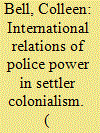|
|
|
Sort Order |
|
|
|
Items / Page
|
|
|
|
|
|
|
| Srl | Item |
| 1 |
ID:
159852


|
|
|
|
|
| Summary/Abstract |
In contrast to narratives by the Royal Canadian Mounted Police, the United Nations, and some scholars that international police assistance is a relatively recent phenomenon, we argue that Canada's Mounties have always been international. To develop this argument, we examine three dimensions of police power in international relations historically and with respect to the role of the Mounties specifically. First, we discuss the concept of police power and its central role in giving rise to another concept: civilization. The concept of civilization gained considerable traction as a rationale for police power in Britain's colonies, including Canada. Second, we turn to a discussion of imperial policing in the colonial settlement of Canada involving an elaborate array of “civilizing” techniques, some of which are still in operation today. Since Confederation, the Mounties have been involved in wide-ranging state-building missions with the purpose of securing Canadian sovereignty, in part through land and resource acquisition, and the denial of Indigenous sovereignties. Third, we show that the Mounties' contributions to settler colonialism played a role in shaping international relations from the twentieth century. In particular, the Mounties were central in constituting Canada as a member of the globally dominant Anglo-Saxon community of states. In conclusion, we suggest that current international policing practices in the global periphery are not novel phenomena, but are rooted in international police powers that made possible the colonial settlement of Canada.
|
|
|
|
|
|
|
|
|
|
|
|
|
|
|
|
| 2 |
ID:
072543


|
|
|
|
|
| Publication |
2006.
|
| Summary/Abstract |
This article examines how Canada's new national security policy operates through language and practices that take elusive risks to the health and safety of the population as an opportunity for action, and is made possible through an expansion of surveillance. The biopolitical character of security has greatly reduced the traditional distinction between the state as a military apparatus and the state as a service provider and manager of the citizenry. The article argues that the biopolitical governance strategies of Canada's national security policy treat the problems for political freedom, equality and democratic accountability posed by encroaching security measures as largely negligible in the face of indeterminable danger. Using a Foucauldian analysis, the article establishes the connection between biopolitics and security. It subsequently examines how the Canadian policy deploys truth claims about the immanence of 'threat' and how claims about Canadian values produce an internal 'other' that represents the proliferation of threats. The article then focuses on two principle techniques of governance: first, guarding the freedom, health and safety of the population, and, second, expanding surveillance to give national security a totalizing reach. The article concludes by theorizing the implications of security governance for legitimating racial profiling and the 'war on terror'.
|
|
|
|
|
|
|
|
|
|
|
|
|
|
|
|
|
|
|
|
|